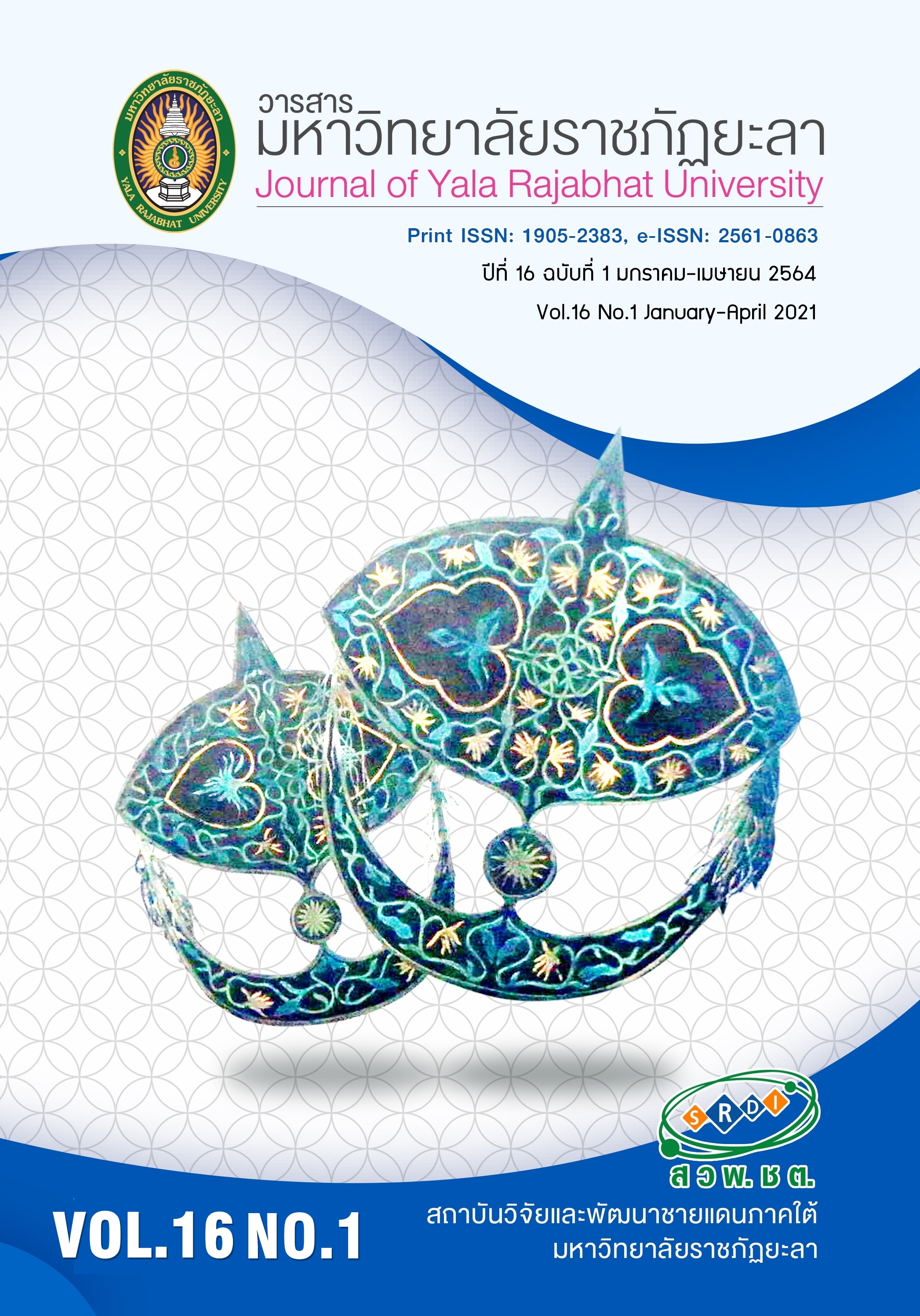โมเดลเชิงสาเหตุของการสื่อสารแบบปากต่อปาก และสื่อสังคมออนไลน์ที่ส่งผลต่อการตัดสินใจใช้บริการสถานบันเทิงยามค่ำคืนในเขตตลิ่งชัน กรุงเทพมหานคร
Main Article Content
บทคัดย่อ
สถานประกอบการที่มีนักท่องเที่ยวจำนวนน้อย การสื่อสารจึงเป็นกลยุทธ์ที่จะกระตุ้นให้เกิดการตัดสินใจใช้บริการ งานวิจัยนี้จึงมีวัตถุประสงค์คือ (1) เพื่อพัฒนาโมเดลเชิงสาเหตุของการสื่อสารแบบปากต่อปาก และสื่อสังคมออนไลน์ที่ส่งผลต่อการตัดสินใจใช้บริการสถานบันเทิงยามค่ำคืน (2) เพื่อตรวจสอบความสอดคล้องของโมเดลกับข้อมูลเชิงประจักษ์ ประชากรและกลุ่มตัวอย่าง คือ นักท่องเที่ยวที่ใช้บริการสถานบันเทิงยามค่ำคืน จำนวน 385 คน เครื่องมือที่ใช้ คือ แบบสอบถาม วิเคราะห์ข้อมูลด้วยสถิติพื้นฐาน และตรวจสอบความสอดคล้องระหว่างโมเดลเชิงสมมติฐานกับข้อมูลเชิงประจักษ์ ผลการวิจัยพบว่า โมเดลเชิงสมมติฐานมีความสอดคล้องกับข้อมูลเชิงประจักษ์ ซึ่งมีค่า χ2 เท่ากับ 42.320 ค่า df เท่ากับ 31 ค่า p เท่ากับ 0.085 ค่า χ2/DF เท่ากับ 1.365 ค่า GFI เท่ากับ 0.986 ค่า AGFI เท่ากับ 0.951 และ RMR เท่ากับ 0.011 ตัวแปรการสื่อสารแบบปากต่อปากและสื่อสังคมออนไลน์สามารถอธิบายความแปรปรวน (R2) ของการตัดสินใจใช้บริการสถานบันเทิงยามค่ำคืน ร้อยละ 23.00 ตัวแปรการสื่อสารแบบปากต่อปากสามารถอธิบายความแปรปรวน (R2) ของสื่อสังคมออนไลน์ ร้อยละ 15.40 ผลจากการพัฒนาโมเดล พบว่าการสื่อสารแบบปากต่อปาก มีอิทธิพลทางตรงเชิงบวกต่อการตัดสินใจใช้บริการสถานบันเทิงยามค่ำคืน อย่างมีนัยสำคัญทางสถิติ 0.05 และสื่อสังคมออนไลน์ มีอิทธิพลทางตรงเชิงบวกต่อการสื่อสารแบบปากต่อปาก อย่างมีนัยสำคัญทางสถิติ 0.001 ดังนั้น ผู้ประกอบการสถานบันเทิงยามค่ำคืนที่ต้องการจะกระตุ้นการท่องเที่ยวควรมุ่งเน้นการสื่อสารแบบปากต่อปาก โดยเน้นการสร้างความประทับใจให้กับนักท่องเที่ยว เพื่อจะได้บอกต่อประสบการณ์ในทางบวก
Article Details
บทความ ข้อมูล เนื้อหา รูปภาพ ฯลฯ ที่ได้รับการเผยแพร่ในวารสารมหาวิทยาลัยราชภัฏยะลานี้ ถือเป็นลิขสิทธิ์ของวารสารมหาวิทยาลัยราชภัฏยะลา หากบุคคลหรือหน่วยงานใดต้องการนำทั้งหมดหรือส่วนหนึ่งส่วนใดไปเผยแพร่ต่อหรือกระทำการใดๆ จะต้องได้รับอนุญาตเป็นลายลักษณ์อักษรจากวารสารมหาวิทยาลัยราชภัฏยะลาก่อนเท่านั้น
เอกสารอ้างอิง
AGODA (2012). 10 Popular cities for nightlife. [Online]. Retrieved December 16, 2019, from: https://www.agoda.com/th-th/info/top-ten-nightlife.html (in Thai)
Balaji, M. S., Khong, K.W., & Chong, A. Y. L. (2016). Determinants of negative Word-of-Mouth communication using social networking. Information and Management, 53(4), 528-540.
Basri N. A. H., Ahmad, R., Anuar, A. I., & Ismail, K. A. (2016). Effect of Word-of-Mouth communication on consumer purchase decision: Malay upscale restaurant. Social and Behavioral Sciences, 222 (June), 324-331.
Boontiangtham, P. (2012). A study of factors affecting tourism decision making expectations and satisfaction of Thai tourists visiting floating market in Taling Chan District Bangkok. Master’s Degree Thesis of Art, Dhurakij Pundit University. (in Thai)
Chiwakunanan, D. (2018). Influence of reviewer in online media and the decision to travel in Thailand. Master’s Degree Independent Study of Business Administration, Thammasat University. (in Thai)
Division of Tourism Economics and Sport, Ministry of Tourism and Sport. (2020). Tourism situation 2019. [Online]. Retrieved March 16, 2020, from: https://www.mots.go.th/download/ article/ article_20200123132729.pdf. (in Thai)
Godey, B., Manthiou, A., Pederzoli, D., Rokka, J., Aiello, G., Donvito, R. & Singh, R. (2016). Social media marketing efforts of luxury brands: Influence on brand equity and consumer behavior. Journal of Business Research, 69(12), 5833-5841.
Hair, J. F., Black, W. C., Babin, B. J. & Anderson, R.E. (2010). Multivariate data analysis. (7th ed.). NY: Pearson Education.
Kaewkalyaya, V. & Sirasirirat, J. (2017). Guidelines for cultural tourism promotion and development of foreigner tourists in Rattanakosin Island, Bangkok. Suan Dusit Graduate School Academic Journal, 13(2), 201-215. (in Thai)
Kim, A. J. & Ko, E. (2012). Do social media marketing activities enhance customer equity? An Empirical Study of Luxury Fashion Brand. Journal of Business Research, 65(10), 1480-1486.
Laksamana, P. (2018). Impact of social media marketing on purchase intention and brand loyalty: Evidence from Indonesia’s banking industry. International Review of Management and Marketing, 8(1), 13-18.
Navavongsathian, A. (2018). The brand exposure, electronic-word-of-mouth communications, and customer satisfaction through social media affecting private label brand trust. Journal of Business Administration, 7(1), 23-37. (in Thai).
Patanasiri, A. & Siricharoen, W.V. (2016). Social media, How does it influence customer purchasing Decision?. The Journal of Social Communication Innovation, 4(2), 152-160. (in Thai).
Phianmana, S. (2018). Satisfaction, trust, service quality affecting JSK customers word of mouth. Master’s Degree Independent Study of Business Administration, Graduate School. Bangkok University. (in Thai).
Ratchabuakort, W. & Khamphon, A. (2015). Destination brand experience, satisfaction, and Word of Mouth: Evidence from Chiangkarn, Loie Provience. The National and International Conference of Business Management and Innovation, September 19-20, 2015. Khon Kaen: Khon Kaen University. (in Thai).
Smithikrai, C. (2010). Consumer behavior. (1st Ed.). Bangkok: Chulalongkorn University Press. (in Thai)
Thuengsuk, J. & Nurittamont, W. (2019). The perception of integrated marketing communications and E-word of Mouth communication effect on intention to purchase organic product of consumers in Bangkok. Journal of Humanities and Social Sciences Surin Rajabhat University, 21(2), 113-124. (in Thai).
Wongthon, S. & Sirisuthikul, V. (2015). Marketing mix from customers’ point of view and motivation relating to decision of current student to pursue graduate studies at Srinakhairnwirot University. Veridian E-Journal, Silpakorn University Humanities, Social Sciences and Arts, 8(2), 1496-1512. (in Thai).
Xiong, L. & Hu, C. (2010). Harness the power of viral marketing in hotel Industry: A network discount strategy. Journal of Hospitality and Tourism Technology, 1(3), 234-244.
Yingbun, S. (2015). Marketing mix on customer’s perspectives, service satisfaction, and customer engagement affecting customer’s decision to loan with Krung Thai Bank Public Company Limited in Suphanburi Province. Master’s Degree Independent Study of Business Administration, Graduate School. Bangkok University. (in Thai).


